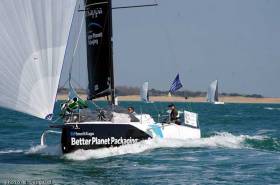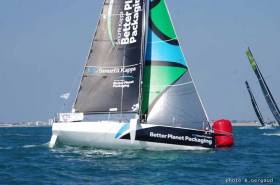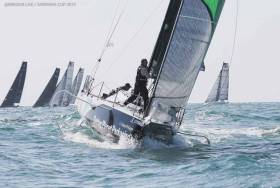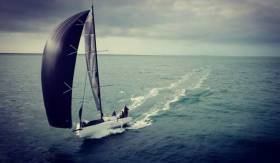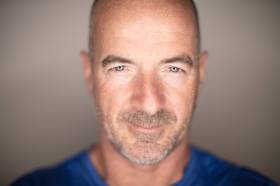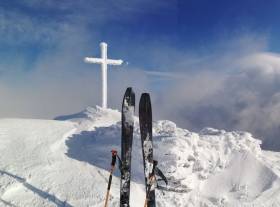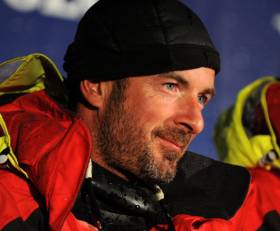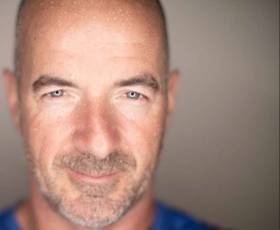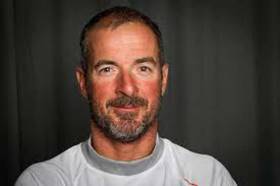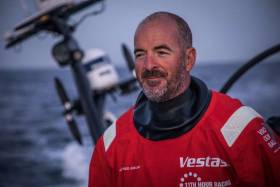Displaying items by tag: Damian Foxall
A glutton for punishment? After a tough, stamina-sapping 408 nautical miles second leg of the Sardinha Cup in strong, gusty winds, freezing temperatures which even brought hailstones, Ireland’s Smurfit Kappa pair Tom Dolan and Damian Foxall cannot wait to go back racing, looking ahead to the third and final stage to try and better their 20th place on Leg 2.
They started well and were well among the contenders in the early stages of the leg which drew a long downwind and upwind between the Gironde estuary, off Bordeaux, and a northerly turning mark off Glenans, south Finistère.
"After the initial losses, Dolan feels they took a riskier option at the Ile de Yeu which did not pay"
Dolan reported, "Just as during the warm-up, we started very well and the early stages were really good for us. But on the downwind to the buoy BXA, we got a fishing line and rope on the keel. It took a while to realise what was happening as we were still making 11-12 knots! We were three or four knots slower than the others for while. We just did not know what was happening. We swapped helming a couple of times. When we did we had to take the kite down and back up. That probably cost us 20 minutes alone.”
After the initial losses, Dolan feels they took a riskier option at the Ile de Yeu which did not pay. “I guess we were frustrated and felt we had to take a bigger risk and lost three boats there.” Smurfit Kappa lies 19th overall in this first series of offshore races for the new Figaro Beneteau 3. The third stage starts on Tuesday afternoon.
“It’s a bit frustrating that happened, it was bad luck. But we are fast. I don’t think we have any problems there. We are probably one of the fastest boats at the moment. There is no real hierarchy at the top, probably 15 good boats emerging with a chance of winning legs. Now for us, it has to be third time lucky doesn’t it!”
Ireland’s Dolan and Foxall Are Relishing The Challenge of The First Big Blast for the Figaro Beneteau 3
If the first stage of the Sardinha Cup, the first offshore races for the Figaro Beneteau 3, proved to be something of a gentle baptism, the 405 nautical miles second stage which starts this Tuesday afternoon at 1600hrs local time, should be a much more complete test of boat handling, speed, strategic choices and stamina.
Ireland’s Figaro duo Tom Dolan and Damian Foxall, co-skippers of Smurfit Kappa, are relishing the next challenge. Well rested and debriefed after their 13th on the short first stage, the duo feel they have a good handle on what will be key on this stage.
The course is expected to last around 48-50 hours, starting and finishing off Saint-Gilles-Croix-de-Vie on the French Atlantic Vendée coast. If light winds marked the opening stage which was shortened because of the calms, this leg will see the 33 duos make a high speed downwind run off the start line in 25-30kts of wind to turn at the entrance to the Saint Nazaire channel at the entrance to the Gironde estuary (by Bordeauz) is followed by a long 150 nautical miles upwind return to turn off the Glénan.
“This will be our first real test in breeze and we are raring to go. It looks like it will be a long, fast night. It will be good to be double-handed for this leg in this breeze as if something goes wrong the other pair of hands can keep you in the game. It will be fast and it will be wet. And cold. This is polar air coming in so at least downwind tonight it might not be so cold.” Said Tom Dolan as he and Foxall prepared to dock out from the pretty Vendée haven renowned for its sardines.
“We were going well through the first leg. We had speed upwind and were good until we made that little mistake. The wind did come in from the east so our strategy was good, we just went too far and were too early for it.” Dolan recalled.
He explains: “The key tonight will be when and if to gybe and that will be determined by a shift coming through which we will need to monitor very closely, and also to keep a very close eye on what we see the fleet are doing. Spinnaker choice and handling will be important. The on the upwind, another crucial decision will be a left shift which looks like it could determine the lay line to the finish and that will be around four or five on Thursday morning, just when we might be at our tiredest, before dawn on the last morning. Lovely!”
This will be the first big downwind ever for the whole fleet and Dolan anticipates that this may be key to the race. Sail choice will be key, between the Code Zero, A4 and A2 spinnakers, going for maximum power but still being able to survive the bullet cold fronts coming through.
“In general when the foil is humming you are fast, so you focus on that. The boat has much more feel and is much more fun than its predecessor and that will make a difference through the night tonight.”
And Dolan feels he is profiting from his partnership with the hugely experienced Foxall.
“I know we Irish are always cool calm and collected on all boats, but Damian is a very cool customer when it gets difficult, his experience really shows and it is great to see how to stay calm and work things out rather than getting in a flap.” Dolan concludes.
Tom Dolan & Damian Foxall Thirteenth in Sardinha Cup First Leg
Irish offshore sailors Tom Dolan and Damian Foxall finished 13th in the new foil-assisted Figaro Bénéteau 3 in the first leg of the Sardinha Cup, France this morning. A second Irish team, Atlantic Youth Trust, skippered by Joan Mulloy and Mike Golding were 32nd in the “Warm Up” Leg of the Sardinha Cup which is part of the 2019 French Championship for Offshore Sailing.
The next leg starts of Tuesday 2 April 2019 with a 600-mile race from St Gilles Croix de Vie to the UK and back.
See the full leg one results here.
The Irish duo had lead off the start line and remained very much in the match, in the leading group for most of the stage, succumbing to one small error on what proved to be the final leg in to Saint Gilles Croix de Vie, the start and finish port.
Dolan reported:
"We are happy with our place and happy with our speed too. We made a small mistake on the long tack between the Ile de Yeu and Les Sables d'Olonne by going a little too close to the coast. We were hoping to get more pressure than the others, but in the end, we lost a lot of places, "explained the skipper of Smurfit Kappa.
"We were in the game for the whole race. As Damian said, we arrived in good company. It's definitely fun to play in the best group, "added the Irish sailor, who reflected on their glamour start: "It was really nice to pass in front of the whole fleet. What I will remember though is that we really have good speed and so we can play a low-risk strategy and look to make small gains here and there." The duo heart from finishing in front of some big names such as Loïck Peyron, Gildas Morvan, Xavier Macaire, Gwénolé Gahinet and Charlie Dalin. "It gives you confidence for the future," Dolan summarised.
Looking ahead to the send stage, Act 2 which starts on Tuesday, Tom said: "We will try to rest and work hard on our navigation and strategy homework as the next stage is longer and carries a three times coefficient. So we would love to do well and feel we can as we have decent speed."
The double-handed series of offshore races comprises a first 147 nautical miles 24 hours opening stage which starts on Saturday, followed by two longer stages of up to 650 miles, starting on 2nd and then the 9th April, each starting and finishing from Saint Gilles Croix de Ville on the French Vendée coast, a town well known for their sardines, hence the inaugural race series’ name.
Dolan, 31, from Kells, County Meath finished third rookie in his first season in the Figaro class but as the fleet adopts the new Figaro Bénéteau 3, he has chosen to draw on the experience of his compatriot co-skipper 10 times round the world racer Foxall, 50, from County Kerry on what promises to be a steep learning curve for all the sailors as they adapt to the new design.
Although the new boat is equipped with foils there seems to be little chance to benefit from them on the first stage, a triangle course formed by passing Ile de Yeu off Les Sables d’Olonne passed on the outwards and the return passage from a buoy Banc de Guérande lying to the west of the entrance to the Loire river at Nantes. Only very light winds are expected and although the name of the opening stage is the ‘Vendée Warm-Up’ the nights will still be long and chilly. Among the 68 sailors on the 34 boats are Volvo Ocean Race winner Charles Caudrelier, Route du Rhum winner Loick Peyron, and two three times winners of La Solitaire du Figaro, Yann Eliès and Jérémie Beyou. But as there has been no racing at all for the new boat, except for informal practice among the training groups, there is no form book.
Foxall explains, “There is a great mix of sailors in the field, some like Erwan Tabarly who joined the class in my last year has done 19 La solitaires in the last 20 years, and Loick Peyron is back, then there are a lot of very, very good singlehanded Figaro sailors, this really is the best of the best. But out of the 34 teams racing there are at least 20 which could win. It is amazing.”
“We feel good, we could all have done more and you can never have done enough,” Dolan confirms, “There is always something more to do, but in that respect, I think we are all in the same position. At the end of the day we have had more sailing than some of the other boats and we have had a couple of good solid weeks working on the boat too.”
The format of the races, long offshore stages with little rest between them, are designed to mirror that of La Solitaire du Figaro URGO, the season’s pinnacle solo event which takes place in June.
Foxall says, “It really is like a mini Solitaire, double-handed. The nights will be longer and colder and it will potentially be windier at some points. But it is a very similar format, short, hard legs where you don’t get a lot of rest, some crucial moments when you have to be absolutely on the ball, going fast and in the right direction, and you have to be doing that three times over the next three weeks. It is a really nice format. It is a really nice way to start with the new boat.”
The duo will rely on their experience to support each other, ensuring Smurfit Kappa is going fast in the right direction, Foxall, who won the two-handed Barcelona Race round the world, explains how they plan to work together on board, “I think it will happen naturally as it does in double-handed sailing. Sailing the boat fast in the right direction is a two-person operation with someone driving and looking after the performance of the boat and the other is maybe looking more out of the boat at strategy and tactics, and making sure the trim of the boat is right, and then when the odd occasion allows some rest we will try and do that.
Because of the very light winds forecast for today on France's Vendée coast, Sunday, Race Direction of the Sardinha Cup made the decision early this morning to shorten course for the opening stage of the three leg race series which is the first test for the new Beneteau Figaro 3 class.
Tom Dolan will form an all-Irish partnership with the vastly experienced Damian Foxall for the first race for the new Figaro Beneteau 3, the Sardinha Cup which starts on March 27th.
After last year’s promising first season in the Figaro one design class, finishing third rookie overall, Dolan has embraced the circuit’s change to the brand new foiling Figaro Beneteau 3, and has spent recent weeks learning how to make the new boat sail fast.
Ten times round the world sailor, a winner of the crewed Volvo Ocean Race and the two-handed Barcelona World Race round the world, Foxall cut his teeth in the solo and short-handed world in the Figaro class in the late 1990s and early 2000s. He became was the first even non-French skipper to win a leg of La Solitaire du Figaro and who finished top rookie in 1997.
The decision to move to the new foil-assisted, faster and more responsive Figaro 3 has proven a magnet to many of the top French ocean racing stars such as Loick Peyron, Michel Desjoyeaux, and Charles Caudrelier as well as three times La Solitaire winners Jérémie Beyou and Yann Eliès.
Dolan received his new Figaro 3 on January 25th and had his first training sessions in February coached by Tanguy Leglatin and Gildas Mahe. “To be honest the training has been going very well.” Said Dolan, who hails from Kells in County Meath but lives in Concarneau.
“We have been among the fastest boats on the water. But like everyone we need to work hard on the manoeuvres. That is where the biggest losses are right now.”
Dolan adds: “It is great to have Damian with me. He is very calm on the boat and his experience is obvious but one of the most important learnings for me has been organisation, discipline and attention to detail, how to run a programme. He has been giving me a bit of a push in that direction and it makes a real difference in terms of confidence in yourself and the programme.”
“But besides all that, we have a good craic together and I have long since forgiven Damian for his County Kerry roots.”
Foxall is delighted to be back in France among many of his Figaro counterparts, French sailors who have remained friends and rivals over the 20 years, and loving the challenge of scaling the Figaro 3 learning curve as fast and efficiently as possible with his fellow countryman Dolan.
“Being on the dock here in Lorient it feels like only yesterday when I was here in my Figaro years. It is fantastic. There is the same kind of sensation with some of the best offshore racers in the world here. It is a fantastic opportunity for us to showcase Irish sailing.” Foxall smiles.
“Tom has been here in France and doing it for a few years and he is well integrated with the sailors here and he is doing well. Here we have top guys like Charles Caudrelier and Alain Gautier and we are holding our place at the top of the fleet.”
Damian Foxall Named Irish Sailing Sustainability Ambassador
Irish Sailing has named Volvo Ocean race veteran Damian Foxall as its sustainability ambassador.
The national governing body for sailing in Ireland says the Kerry sailor — who served as sustainability manager for Vestas 11th Hour Racing in the most recent edition of the VOR — “has committed to helping us support sailors, clubs and centres to make sailing in Ireland environmentally sustainable and help reduce our carbon footprint.
“We are excited to announce that he has committed to attending a number of Irish Sailing events to help share advice on sustainability and environmental impact.
“Damian brings a wealth of knowledge and experience to the table for us all to learn from. He completed 10 round-the-world races and is a passionate ocean conservationist.”
The ocean consultant will be guest speaker at the Irish Sailing Cruising Conference in Lough Ree Yacht Club next Saturday 16 February, and will also be presenting Irish Sailing’s first Sustainability Award at tonight’s Volvo Irish Sailing Awards – just a few days after his recent skiing adventures on Ireland's highest peak.
Volvo Ocean Race Veteran Damian Foxall Descends Ireland’s Highest Mountain On Skis
Kerry’s own Volvo Ocean Race winner Damian Foxall has made the news for a very different achievement — descending Ireland’s highest mountain on skis.
The veteran round-the-world sailor made an early start on Saturday morning (2 February) for the ski climb to the peak of Carrauntoohil before the 400-metre descent to the Devil’s Ladder, making the most of the recent heavy snowfall.
As RTÉ News reports, the weekend’s feat marked Foxall’s first attempt to ski the slope known locally as the Shoulder of Corrán.
“The feeling was unreal, exhilarating, a once-in-a-decade experience,” he said.
But the weekend didn’t end there for Foxall as he joined his friend and fellow sustainability manager Lucy Hunt, from the Sea Synergy Marine Awareness and Activity Centre in Waterville, for an adventurous Sunday on skis in the mountains.
The pair went from Curve Gully to Carrauntoohil, then followed the ridge line to four more peaks of the McGillycuddy Reeks “in Alpine conditions”, according to Foxall’s Facebook page.
‘No Compromise’ On Sustainability In Volvo Ocean Race Says Damian Foxall
#VOR - Kerry sailor and Volvo Ocean Race veteran Damian Foxall had a very different role in the most recent edition of the round-the-world yacht race.
As sustainability manager for Vestas 11th Hour Racing, Foxall was responsible for guiding the team towards the title of the race’s ‘most sustainable’. His secret? “No compromise.”
Foxall spoke to Sport Sustainability Journal upon the publication of his team’s comprehensive sustainability report, which outlines various initiatives from grants for local projects along the route, to carbon reduction and offsetting on the yacht and among the crew.
The latter included the likes of reduced plastic packaging for official race clothing supplied by Musto, to ‘meatless Mondays’ below deck.
“The further we got into the race … we found sustainability brought a depth and strength to our team,” Foxall says.
Sport Sustainability Journal has much more on the story HERE.
Damian Foxall Podcast: Volvo Ocean Race Crew 'Shenanigans', Marine Debris, What it Takes to Make it Offshore & Who to Call if You Hit a Whale
Ireland’s Sailor of the month for October, Damian Foxall talks (play podcast below) about Sunday's start of the Volvo Ocean Race 6,000–mile leg two to Capetown. From the deck of Vestas 11th Hour Racing, he tells about crew 'shenanigans' aboard the VOR 65s and admits Dong Feng and Mapfre are two very serious competitors in a one design fleet where the gains between boats are very small. Ireland's high seas superstar also admits the fleet is waiting with 'bated breath' for news of the new race CEO.
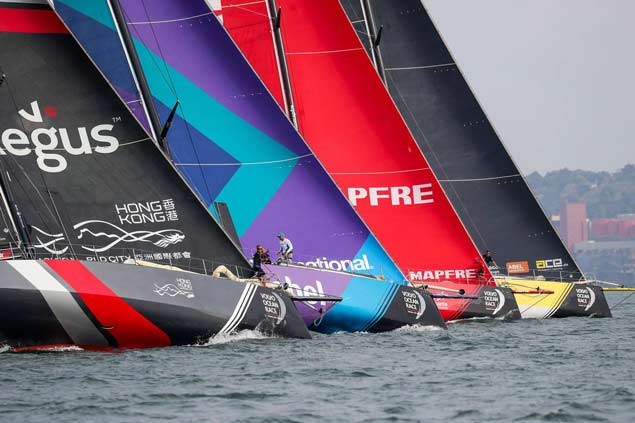 VOR Teams that established themselves early with solid crews have already shown they have an advantage. According to Foxall, Dong Feng and Mapfre are two very serious competitors Photo: VOR
VOR Teams that established themselves early with solid crews have already shown they have an advantage. According to Foxall, Dong Feng and Mapfre are two very serious competitors Photo: VOR
Foxall recalls last month's leg one win and sets out the clear objectives of Vestas 11th hour racing that includes so much more than just winning his second VOR title. Endorsing the VOR's marine debris campaign, the County Kerry offshore racer maintain's that it is 'unacceptable' for any sailing event to be using single use plastic bottles. There's news too about why marine clothing firm Musto has reduced its product packaging by 80% and who to call if you hit a whale...
Finally, Foxall has advice for Nin O'Leary, Annalise Murphy and all the other up and coming Irish offshore racers keen to follow in his wake...and why, as Foxall maintains, Ireland has not yet realised its great marine resource potential.
Listen in to the podcast below...
Damian Foxall Fact file
Date of birth: 7 March 1969
In: County Kerry, Ireland
Legs sailed in this edition: Leg 1
There’s not much that five-time Volvo Ocean Race veteran and passionate ocean conservationist Damian Foxall hasn’t done when it comes to sailing. He won the Volvo Ocean Race as part of Groupama in 2011-12, set a round-the-world speed record onboard G-Class catamaran Cheyenne, and took victory in the two-handed Barcelona World Race in 2008, adding all that to his record as the first ever non-French entry to grab a leg win at the Solitaire du Figaro in 1997. Now, he returns to the toughest test of a team in professional sport looking to lift the trophy for a second time.
Previous Volvo Ocean Races:
2014-15 Dongfeng Race Team
2011-12 Groupama sailing team
2008-09 Green Dragon
2005-06 Ericsson
2001-02 Tyco
Damian Foxall is 'Sailor of the Month (Senior)' for October
The Afloat.ie “Sailor of the Month” process in October is normally self-selecting, as the Senior and Junior awards go to the new Irish Sailing All-Ireland Champions. But when Fionn Lyden of Baltimore demonstrated at Mullingar in 2017’s Championship of Champions on Lough Owel that he was well able to transfer his skills in the Laser and Olympic Finn to the venerable GP 14, it provided the adjudicators with a new choice option, as he was already August’s Sailor of the Month for winning Bronze at the U23 Finn Worlds in Hungary, and the All-Ireland title simply added to his laurels.
Happily, in some very neat choreography, the final weekend of October brought forth a star of equal status. Going into the first leg of the seven-boat Volvo Ocean Race from Alicante to Lisbon starting October 22nd, Vestas 11th Hour Racing was far from being rated the favourite. But from an early stage she steadily increased her lead in such a convincing style that it wouldn’t be fair to say who had in fact been the pre-race favourites. Even a mixture of local windlessness and an adverse tide approaching the finish line still left Vestas with a clear lead of more than two hours. And a key role in all this was played by Ireland’s own high seas superstar Damian Foxall, our “Sailor of the Month (Senior)” for October.
Listen to the Damian Foxall podcast from Lisbon here
Leg One Win Puts Foxall's Team Vestas Into Volvo Ocean Race Lead
As Afloat.ie reported, Irish sailor Damian Foxall and the Vestas 11th Hour Racing crossed the finish line in Lisbon at 1408 UTC ahead of their competitors by a few hours earning 8 points and are now the leaders of the Volvo Ocean Race. They led the 7-day race since the first night staying ahead of the other seven boats through the Strait of Gibraltar, around the island of Porto Santo, and north to Lisbon via a virtual waypoint added by the Race Committee mid-leg.
“Can’t argue with the results,” said skipper, Charlie Enright upon finishing in Lisbon. “For us, it has always been the process and improving every day. We prioritized getting the right people and this provides us with a lot of confidence. I can’t say enough about the squad on the boat and the ones on the shore.”
“To kick it off this way is a strong sentiment to the team,” added Team Director and Co-Founder, Mark Towill. “We have a long way to go for sure, and this is a great way to start the event.”
This is technically back-to-back ocean leg wins for the American duo, Enright and Towill. The pair along with their fellow US sailor, Nick Dana, won the final leg of the last edition onboard Team Alvimedica. This is the first leg win for Vestas, and for a Danish flagged boat in the history of the Volvo Ocean Race.
The team is now in Lisbon for one week participating in outreach events with the local community, an In-Port Race, Pro-Am racing, and preparing for the 7000-mile leg to Cape Town, South Africa that starts on November 6th.
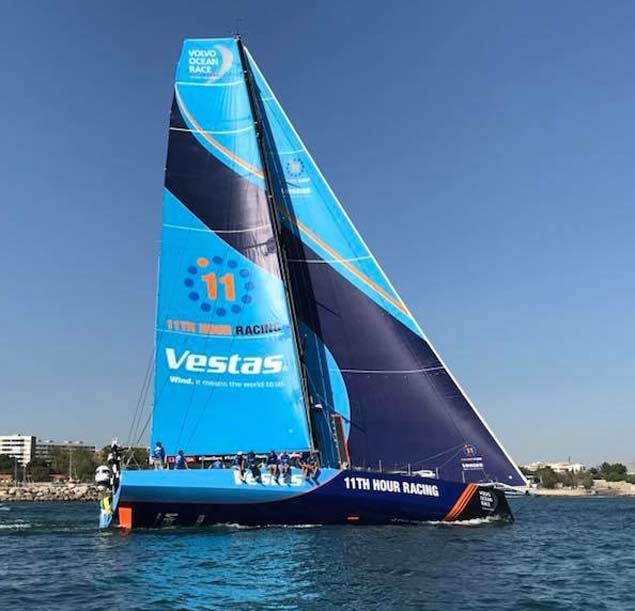
The Race to Win
Vestas 11th Hour Racing led for the majority of the 1650 nm course that took the seven teams from Alicante, Spain to Lisbon, Portugal.
"We had a good leg. And that’s due to the strong shore team preparation with Chris Bedford, our meteorologist, Anderson Reggio for navigation support, and Vestas’ meteorology team. We had a plan and could be proactive instead of reactive," said Simon Fisher (SiFi), winner of the last Volvo Ocean Race as navigator.
The first night the crew took a risk by sailing close to the shoreline of southern Spain hoping for wind coming off the mountains not seen on weather forecasts. The gamble paid off as they were the first in and out of the Strait of Gibraltar, an area known for high winds, shipping traffic, and a narrow path for maneuvers.
According to SiFi, "we then got fired out of Gibraltar at 30 knots. We saw as high as 35 knots and we gybed back and forth quite a few times to stay in the pressure which is definitely exhausting for the team."
By Day 2, the sailors extended their lead 25 miles from the second place boat, but it was short-lived as it shrank to 6 miles in just a few hours, as they were the first to sail into a lighter pressure system.
"We had good scheds and bad scheds," said Charlie Enright, referring the position reports delivered to the team every six hours. "It's frustrating to see the others take a bite out of your lead."
The vexations started to wane as the crew rounded the island of Porto Santo still in the lead, and a downwind drag race ensued north to a virtual mark 250nm away. The race committee added the mark after Day 2 to extend the course to align with the intention of a 7-day leg.
After turning the virtual mark, the team continued to extend attributing their speed to the sail choice and crew work. While all the teams have the same sails onboard, it is up to the individual crews to decide which of the seven headsails are the optimal combination for varying conditions.
"We are fortunate enough to have a well-rounded crew who can jump into any position on the boat, whether that is driving, grinding, or trimming," said Team Director, Mark Towill. "That allows everyone to stay fresh and execute our navigation plan."
"We are not talking about the finish onboard yet," said young Australian sailor, Tom Johnson just 24 hours before the finish. "No one is taking a back seat, we are just all doing our job."
The last 24 hours were tough as the crew faced shifting light winds, a traffic separation scheme that limited their navigation, and 4 miles of upwind sailing in a narrow river to the finish, but in the end the crew recognizes this is only beginning of a longer race that will take them around the world over the next 9 months.
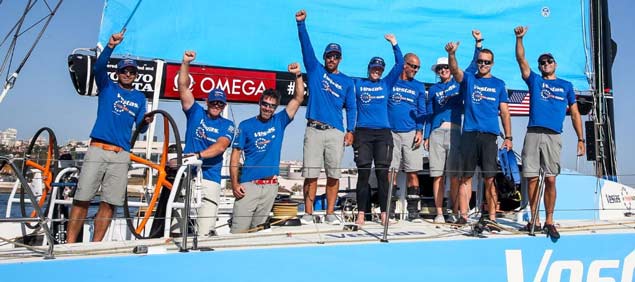 Team Vestas celebrate leg one victory, Damian Foxall is fourth from right Photo: Jesus Renedo/Volvo Ocean Race
Team Vestas celebrate leg one victory, Damian Foxall is fourth from right Photo: Jesus Renedo/Volvo Ocean Race
Life Onboard
The first leg of the race was an exhausting all-out sprint for the team. Executing multiple maneuvers in the initial 36 hours means there little sleep for the crew. Then in the light air, the monotony of waiting for wind is a mental game the teams must push through to be ready for the next situation.
When not keeping the boat going fast, preparing food, washing dishes, and maintenance are tasks the sailors share onboard. Fresh food only lasts for the first few days; then they switch to freeze-dried meals. The crew partook in Meatless Monday, an international campaign to reduce the impact the meat industry has on the environment on the first day out at sea. "We are enjoying Mediterranean veggie pasta," said Mark Towill, "it is one simple way of lowering our carbon footprint and is part of our commitment to sustainability."
The boat also had to overcome a few systems failures onboard during the leg. A broken water pump the first day left the crew without fresh water until boat captain, Nick Dana, was able to fix the issue. He explains, "it's not like we can go out and get a new one, everything must be fixed onboard, but that's the Volvo Ocean Race." Repair and reuse is another key element of sustainable living.
Then on the evening of Day 4, skipper Charlie Enright, felt the performance of the boat "just wasn't right" so he went below only to discover a disconnected water ballast hose filled the yacht with 800 liters of water. The crew bailed the water and repaired the hose, luckily, not losing too much speed in the process.
It’s not all work onboard a Volvo Ocean 65. On the morning of Day 6, race rookie and British sailor, Hannah Diamond took a moment to soak it all in: "It's been a really nice sunrise and had a couple of pods of dolphins come past, so couldn't ask for more really."



























